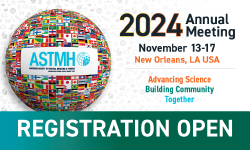| Past two years | Past Year | Past 30 Days | |
|---|---|---|---|
| Abstract Views | 1437 | 1069 | 124 |
| Full Text Views | 9 | 2 | 1 |
| PDF Downloads | 9 | 4 | 2 |
Dengue-2 Vaccine: Infection of Aedes aegypti Mosquitoes by Feeding on Viremic Recipients
Search for other papers by William H. Bancroft in
Current site
Google Scholar
PubMed
Search for other papers by Robert McN. Scott in
Current site
Google Scholar
PubMed
Search for other papers by Walter E. Brandt in
Current site
Google Scholar
PubMed
Search for other papers by Jack M. McCown in
Current site
Google Scholar
PubMed
Search for other papers by Kenneth H. Eckels in
Current site
Google Scholar
PubMed
Search for other papers by David E. Hayes in
Current site
Google Scholar
PubMed
Search for other papers by Douglas J. Gould in
Current site
Google Scholar
PubMed
Search for other papers by Philip K. Russell in
Current site
Google Scholar
PubMed
Abstract. Colonized Aedes aegypti mosquitoes were fed on voluntary recipients of an experimental, live, attenuated, dengue type 2 (PR-159/S-1) vaccine to estimate the frequency of vector infection and the stability of the virus in mosquitoes. Two volunteers were viremic at the time of mosquito feeding, but only two of 114 mosquitoes that took a viremic blood meal became infected with the vaccine virus. Strains of virus recovered from the bodies of the mosquitoes and the volunteer's blood retained the temperature sensitivity and small plaque growth characteristics of the vaccine virus. Dengue viral antigen was not detectable in any of the mosquito heads by direct immunofluorescence and in vitro virus transmission by droplet feeding was not observed. This experiment showed that vector mosquitoes can be infected with vaccine virus by feeding on viremic vaccinees. Furthermore, the virus is sufficiently stable to retain the in vitro growth characteristics associated with the vaccine virus.
Author Notes
| Past two years | Past Year | Past 30 Days | |
|---|---|---|---|
| Abstract Views | 1437 | 1069 | 124 |
| Full Text Views | 9 | 2 | 1 |
| PDF Downloads | 9 | 4 | 2 |








